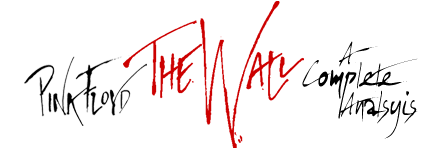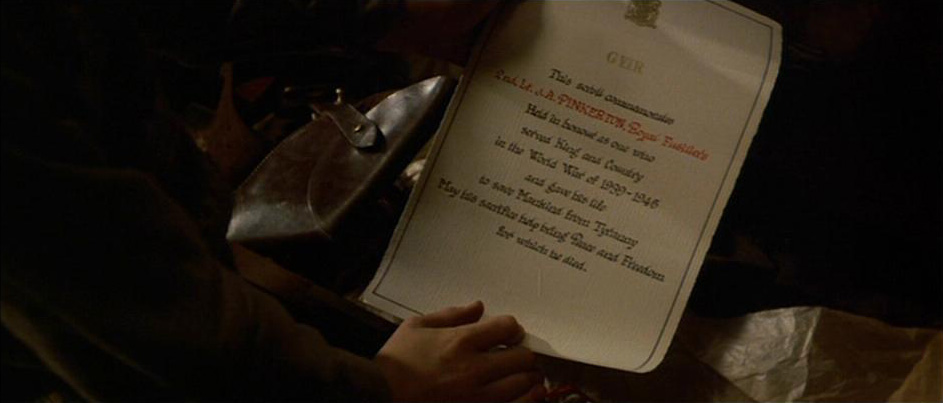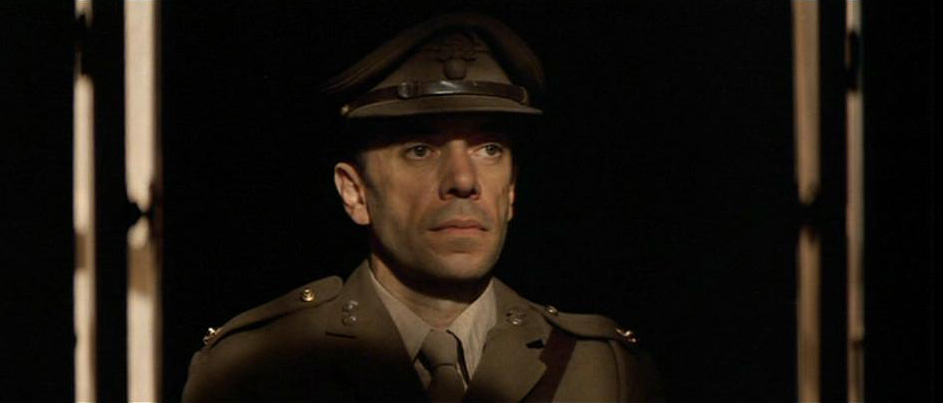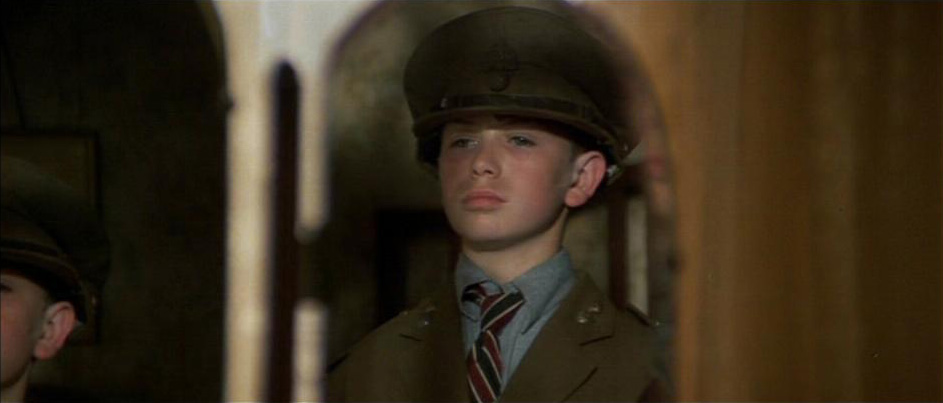When The Tigers Broke Free, part 2
[Roger Waters]And kind old King George sent Mother a note
When he heard that Father was gone.
It was, I recall, in the form of a scroll,
With gold leaf and all.
And I found it one day
In a drawer of old photographs, hidden away.
And my eyes still grow damp to remember
His Majesty signed with his own rubber stamp.
It was dark all around, there was frost in the ground
When the Tigers broke free.
And no one survived
From the Royal Fusiliers Company Z.
They were all left behind,
Most of them dead, the rest of them dying.
And that's how the High Command
Took my daddy from me.
Song In A Sentence:
Pink feels betrayed by his country, especially those in power, for sending his father to war and treating his death as just another statistic.
T he second part of “When the Tigers Broke Free” serves as both Waters’ and Pink’s most emotional lament for the loss of a father. Narratively speaking, young Pink finds a drawer full of war memorabilia, most notably his father’s death certificate sent by “kind old King George.” What is only hinted at by tone and changes in verb tense in previous songs is readily admitted here; for the first time in the childhood songs, Pink sings “it was, as I recall,” clarifying the fact that these are memories tinted by his current mental state, not necessarily a clear-cut and entirely pretenseless retelling of personal history. Despite the admission of personal recollection, both of the “Tigers” songs have a curiously detached, almost omniscient (i.e. Godlike) point of view for most of the verses, especially the first half describing the last hours of Pink’s father’s life. While such conflation of the first person point of view with the almost God-like third person possibly mirrors the adult Pink’s own detachment from reality, I think it’s also telling about Waters himself, who as fictive Creator can’t help but slip his own history and recollections into the arc of his creation, further blurring the line between Pink as a character and Pink as autobiography. In the DVD commentary, Waters’ relates that he also found his father’s death scroll in a drawer along with a collection of other war memorabilia, including service pistols and ammunition. Accordingly, the emotion of this song is perhaps the most pure of any song on the album in that it stems directly from the creator’s own psyche. Whereas other songs mix true events with fiction or combine the lives of a few people into one story, “When the Tigers Broke Free” is an unadultered account of Water’s childhood and his father’s death, making it for many one of the most haunting songs in the Wall canon.
As with the first “Tigers,” there is little need for a symbolic discussion of the song’s rather straightforward lyrics. In a nutshell, young Pink finds a scroll sent to his mother by the British government announcing his father’s death. And just like the first “Tigers,” some of the more interesting aspects about this second part are the subtle connotations in the lyrics that give a bit of emotional insight into the narrator’s mind. With the first part, words like “miserable” and “ordinary” belied the narrator’s seemingly detached point of view, hinting at the cynicism and grief behind the composed voice. The second part is no different, though perhaps much more effective in that the narrator is finally given an identity, and the pent-up grief hinted at in the first part is finally given something of a release.
After years of being told about his father’s death in the war, Pink finally comes across the sort of documented proof that many might think should bring him some amount of closure. Instead, the very sight of the scroll dredges up all of those bitter feelings of blame he directed at his father in “Another Brick, Part 1,” though now the crosshairs of blame fall squarely on the English government and the seemingly routine manner they’ve written off his father’s death. The death announcement is likened to an informal “note” based more on a breezy rumor than grave circumstances. The honor typically inherent in the ancient scroll form and gold leaf is all but tainted by the king’s rubber stamp signature, which for Pink implies that his father’s life and the lives destroyed by the war are inconsequential, not even worthy of an actual, monarchal signature. Accusations of governmental betrayal continue when Pink recounts that “they [the soldiers] were all left behind / Most of them dead, the rest of them dying” after the Tigers (the German war tanks) attacked the Anzio bridgehead. Improbable though it is that the British government heartlessly betrayed its own forces, it’s easy to see how Pink could feel such overwhelming bitterness towards the very institution that sent his father to his death and then treated him as another war statistic. Whether rational or not, this feeling of personal betrayal by the High Command for taking “my daddy from me” is nonetheless considerable, paving the way for future frustration with social systems as seen in songs like “Another Brick in the Wall, Part 2” and “Mother.”
Other interesting lyrical aspects of the song are the apparent allusions to imagery in previous songs as well as the larger themes of the album. Pink finds the scroll in “a drawer of old photographs, hidden away,” a lyric reminiscent of the memory of Pink’s father as “a snapshot in the family album” from “Another Brick in the Wall, Part 1.” This line also calls to mind the psychological defense mechanism of repression, what with the “old photographs” (ie, memories) forgotten in the “drawer” of one’s mind. Pink’s discovery of the tucked-away memorabilia could be said to represent the momentary resurfacing of repressed emotions surrounding his father’s death, resulting in the brief outburst in the latter half of “Tigers, Part 2.” This cycle of repression > resurfacing > outburst is enacted time and again throughout the album at various times, social situations and imaginings.
It’s also interesting to note that Waters chose to mention the “frost in the ground,” a detail referencing the wintertime battle that took his dad’s life as well as a possible allusion to the desolate, frozen imagery of “the Thin Ice.” As with the cracks in the ice that “appear under your feet,” the frost in “Tigers” reminds the audience of what Pink sees to be the futility of life, the burdens placed on us all (in this case, the burden of war), and every man’s eventual demise.
Although there is little narrative development during the movie scenes for this song, the emotional impact is immense. True to the song’s narrative, young Pink (now around the age of 12 – 13) comes home from school and finds his father’s death certificate in the bottom drawer of a dresser in his mother’s room. [Note that Pink’s father’s name is listed on the scroll as J.A. Pinkerton, suggesting that Pink isn’t our protagonist’s real name at all but rather a childhood nick name, as evidenced by his friends addressing him as “Pinky” at the beginning of the movie sequence for “the Happiest Days of Our Lives.” It would appear that “Pink” is yet another disguise we have to claw through in order to get to the core of the man whose real name – Floyd Pinkerton? – we’re never even told.] Along with the scroll he finds a shaving razor – a very male symbol, Waters muses on the DVD, and one that is missing from Pink’s life – as well as a box of bullets. Beneath it all he finds his father’s military uniform, which he puts on in front of the mirrors of his mother’s bureau. Cutting between shots of young Pink and his father in the same outfit, this sequence further embodies Waters’ love of cycles with the young taking the place (and the burdens) of the old. Pink’s father wears the uniform of his country and takes on the burden of the war being waged. Pink wears the uniform of his father and takes on both the burden of losing that very same father as well as the effects the war has had on the country and the world. In a strict metaphorical sense, the father is Pink’s doppelganger (and vice versa), acting as the ghostly double of Pink; they are mirror images of each other, fighting a war neither asked for (whether real or metaphorical) and carrying the burdens of the previous generation. This idea of the doubled self is further compounded by the fact that the viewer sees the subjects (Pink / Father) through the mirrors of the bedroom bureau rather than by a direct shot of the subjects themselves. Mirror images though they are in appearance, a psychic schism is evident in the composition of the shots. While the father is shown from a mostly stationary angle, the son is is seen in three separate mirrors at once, arguably hinting at Pink’s more fractured identity. It’s also intriguing that Pink is looking at himself in his Mother’s mirrors. Symbolically, mirrors have represented everything from the true self, the way one views oneself, or the way one wants others to view him or her. The reflected images of young Pink reveal all of the above, showing Pink as he is (the young boy beneath the uniform), Pink as the metaphorical extension of his father (Pink in uniform), and the way Pink’s mother views her son, as both child and vessel for her feelings over the loss of her husband. Each separate image is another fracture in Pink’s persona, another brick in his ever-growing wall.bridled grief of “When the Tigers Broke Free, Part 2.”
What Other Floydians Have Said
"In battle, when an army decides to retreat (a very vulnerable maneuver), a small detachment from the main body of the army will be left behind to slow the enemy down. This is known as the rear guard. Though the rear guard is not expected to defeat the oncoming enemy army, they are expected to hold them off long enough for the main army to escape, at which point the rear guard can then ‘disappear into thin air’ or disburse. It is this 'sacrificial lamb' that will provide the needed protection for the others to escape. Without this, it is not uncommon for the main body of the army to take such loses as did the rear guard. Thus, if nobody does it, then everybody will have to suffer. The question becomes not 'who will have to stay and die,' but 'who will live.' It turns out that Roger Water’s father died at Anzio as a member of the rear guard. (Click here to visit an account of the Anzio defensive. Though the account was made by the US military, you will see mentions of the Royal Fusiliers and some examples of rear guard actions if you search for the phrase 'Allied artillery spotted his position and began firing on the company'). Note the date, which was the same date as the 'Tigers Broke Free' and his father died. Also of note is the official record of his fathers death [Click here]. The idea of having to select a company to serve as a rear guard for the good of the army is highly unpleasant and only begins to describe some of the difficult decisions that officers have to make. Yet as unpleasant as that is, it does not even begin to describe the uncomfortable feeling that you get when the friends and family of the deceased rear guard soldier finds out how their loved one died. - Lucas Perea
'The following links include additional media (paintings and photographs) depicting the fighting at Anzio:'
'Anzio Harbor Under Bombardment'





